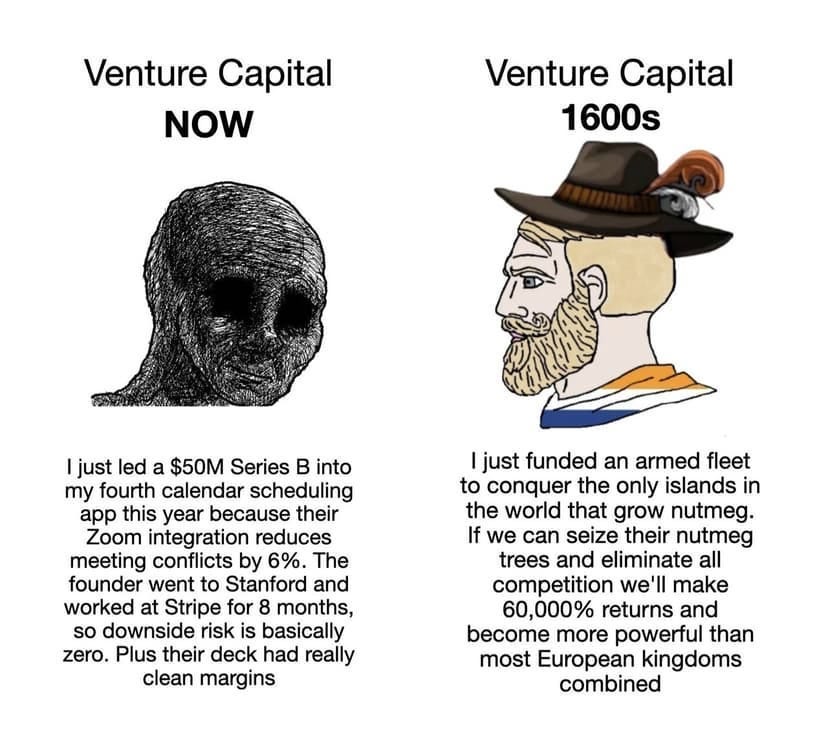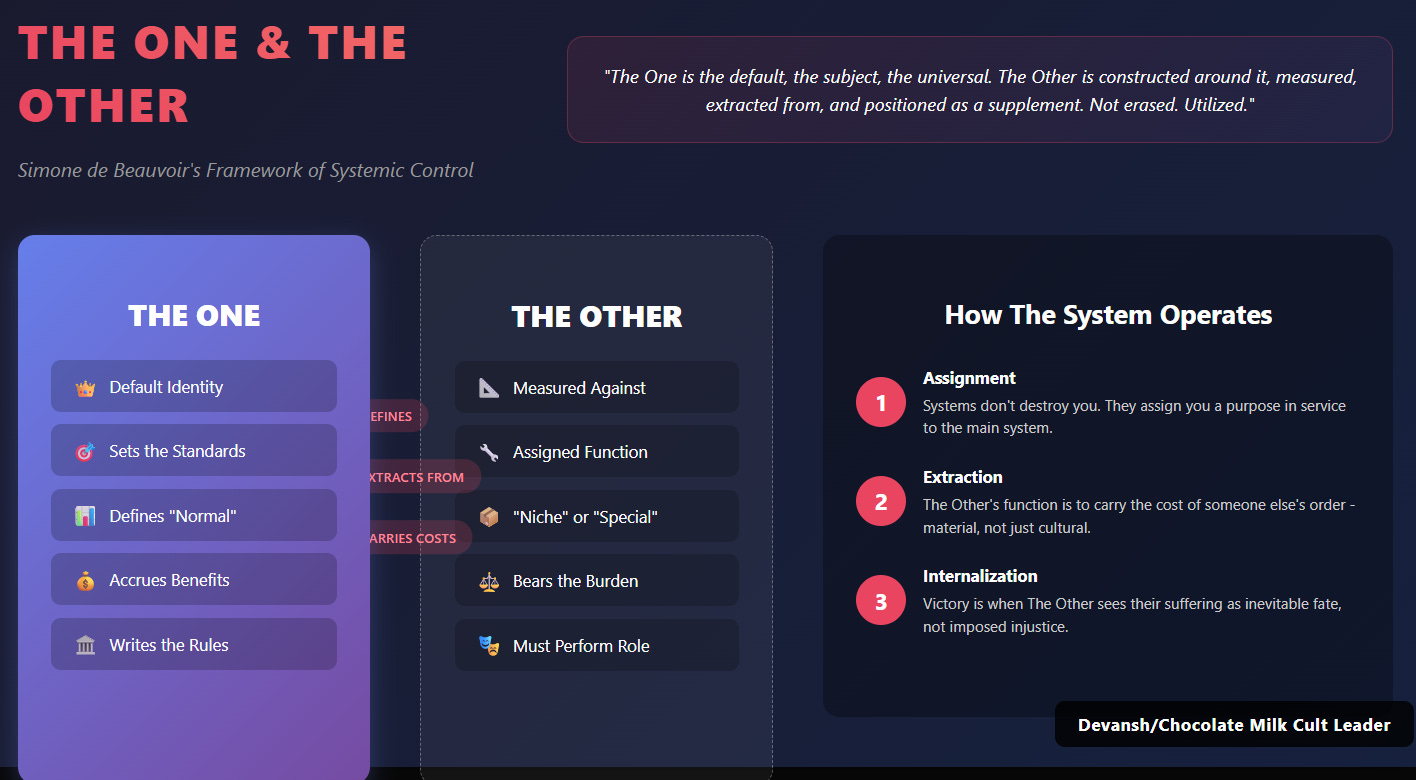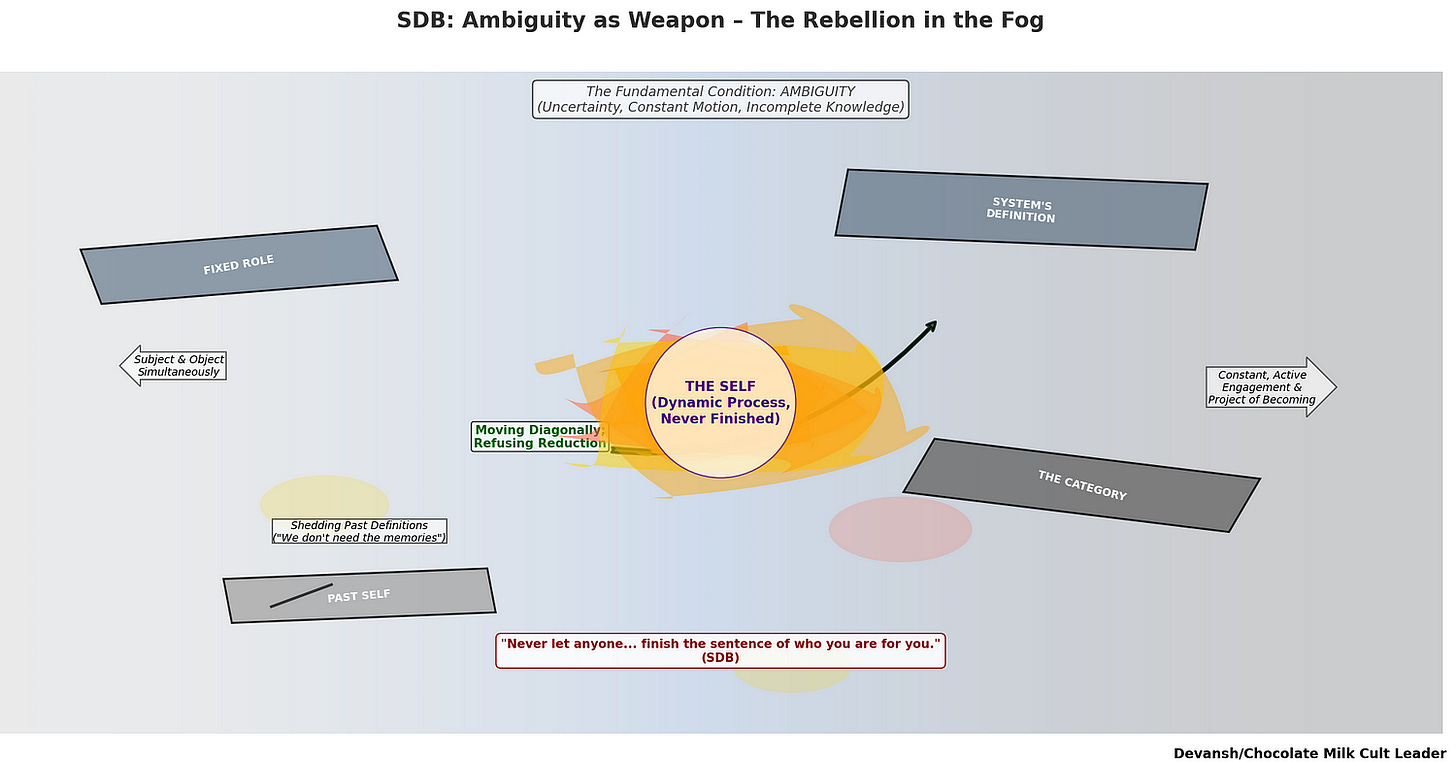Why you should read: Simone de Beauvoir [Recs]
A Strategic Guide to Existential Freedom, Confronting Otherness, and Refusing Definition.
It takes time to create work that’s clear, independent, and genuinely useful. If you’ve found value in this newsletter, consider becoming a paid subscriber. It helps me dive deeper into research, reach more people, stay free from ads/hidden agendas, and supports my crippling chocolate milk addiction. We run on a “pay what you can” model—so if you believe in the mission, there’s likely a plan that fits (over here).
Every subscription helps me stay independent, avoid clickbait, and focus on depth over noise, and I deeply appreciate everyone who chooses to support our cult.
PS – Supporting this work doesn’t have to come out of your pocket. If you read this as part of your professional development, you can use this email template to request reimbursement for your subscription.
Every month, the Chocolate Milk Cult reaches over a million Builders, Investors, Policy Makers, Leaders, and more. If you’d like to meet other members of our community, please fill out this contact form here (I will never sell your data nor will I make intros w/o your explicit permission)- https://forms.gle/Pi1pGLuS1FmzXoLr6
“Every authoritarian party regards thought as a danger and reflection as a crime.”
― Simone de Beauvoir
Spend enough time in the worlds of tech, finance, or new media, and an interesting contradiction unfurls. We worship individuality — the disruptive founder, the sovereign thinker, the self-made outlier who bends history to their will.
Yet, beneath this veneration, a different current pulls: an unspoken pressure to conform, to perform identity on cue. “Ideal” careers that follow predictable arcs. VCs chasing nonconformists using identical templates: B2B SaaS, ex-FAANG, Stanford dropout. People screening potential friends or partners, with checklists “all to protect their peace” or “save time”.
Simone de Beauvoir saw this clearly. Long before personal branding or algorithmic identity, she named the deeper tension: the fear of self-authorship.
We must deal with the crushing weight of being fully responsible for our own lives. This crushing pressure is the real reason we don’t want freedom. We want something else.
We want someone to tell us who we are. Standards by which we can judge ourselves. And this deep desire is co-opted by people to make us surrender ourselves, to renounce our freedom to think in favor of simplistic “us vs them” dynamics. To surrender our will, our passion to others.
In a frictionless world like ours, the implications are profound. Never has it been easier to go down rabbit holes, to hate our neighbors based on the proclamations of confident strangers, to gleefully tear both others and ourselves apart in a bid to match templates.
This piece explores how Beauvoir understood that pattern — and why her solution remains one of the sharpest weapons against it.
Executive Highlights (TL;DR of the Article)
Most people don’t avoid freedom because they’re weak — they avoid it because it demands total responsibility. Simone de Beauvoir called this the existential burden of self-authorship.
To escape this pressure, people fall into Bad Faith: they adopt prepackaged roles, ideologies, or identities to avoid having to define themselves from scratch.
Society exploits this fear. It offers fixed roles that appear safe — but are designed to stabilize the dominant order. This leads to the production of The Other: individuals or groups reduced to functions that support the system’s needs.
Being “Othered” isn’t about exclusion — it’s about being made legible, useful, and disposable. You don’t vanish. You’re processed.
Beauvoir’s counter-strategy is ambiguity: not confusion, but the refusal to be finalized. It means embracing your unfinished, contradictory nature as a source of power.
In systems that rely on categorization for control, ambiguity becomes resistance. You can’t dominate what you can’t define.
True freedom isn’t a fixed identity or clean escape — it’s the ongoing ability to stay in motion, to choose without guarantees, and to refuse every easy sentence written about you.
I put a lot of work into writing this newsletter. To do so, I rely on you for support. If a few more people choose to become paid subscribers, the Chocolate Milk Cult can continue to provide high-quality and accessible education and opportunities to anyone who needs it. If you think this mission is worth contributing to, please consider a premium subscription. You can do so for less than the cost of a Netflix Subscription (pay what you want here).
I provide various consulting and advisory services. If you‘d like to explore how we can work together, reach out to me through any of my socials over here or reply to this email.
Section 2: Bad Faith and the Comfort of Cages
“The sub-man is not unaware of his freedom; he is the man who tries to hide it from himself because he is afraid of it. He chooses to be nothing, in order to escape the anxiety of choosing to be something. By refusing to make himself a being through the affirmation of his freedom, he tries to lose himself in the object, to make himself a thing. But he is not a thing; he is a man. And the flight from himself, the rejection of his condition, is a falsification of his relation to the world and to others. He becomes an accomplice in the dehumanization of man.”
When the burden of self-authorship becomes too great, people seek relief.
They want a role. An archetype. A story that spares them the full weight of choosing who they are.
Simone de Beauvoir called this move bad faith — the quiet decision to become an object instead of a subject. To trade freedom for legibility. To let meaning be assigned, so you don’t have to build it.
Bad Faith is not about malicious intent; it’s a subtle act of self-deception. It’s the choice to deny our fundamental freedom and responsibility, to pretend we are objects shaped by external forces rather than subjects who choose. When the weight of creating our own meaning becomes too heavy, Bad Faith offers an alluring out: we can become “a type of person,” adopt a pre-fabricated identity, or lose ourselves in a collective. We trade the terrifying expanse of authentic selfhood for the perceived security of a well-defined role.
In Beauvoir’s work, this is most often articulated in her analysis of how women have historically been assigned pre-scripted roles designed to serve and stabilize the social order around them: mother, wife, muse, caretaker. Each role is framed as natural, noble, and even empowering. Each one is a pre-packaged identity that replaces the demand of freedom with a performance of virtue. Each requires the woman to give up her agency in order to be a supporting role- “to stand behind a successful man”.
(Interestingly, this isn’t limited to women- many men can also attest to how they’ve been viciously attacked, by all genders, for “not behaving like a proper man”. Identity and idealogy oppress all.
This oppression extends far beyond gender.
The same structure repeats across every domain: a system offers safety, validation, and belonging — but only if you agree to be legible. Only if you agree to be something that fits. Something that can be named, framed, and grouped with other similar things.
In modern terms, it could look like this:
Your life is forced into a corporate-friendly life story. When I was raising money for Iqidis (the best Legal AI, you can try it for free here), I was strongly advised to hide all information about my past in underground cage fighting or my work in breaking autonomous weapons systems and government surveillance platforms b/c it made me “seem like a criminal”.
Your identity is shaped by what performs best online. It’ll never make sense to me how much energy is spent by people expressing themselves on social media by copying others, “curating a brand”, and “having an aesthetic”.
Remarkably ambitious and potentially world-changing startups are getting passed over b/c their founders don’t hit all the “checkboxes” while hundreds of millions gets poured into AI to improve sweatshops and screw over factory workers.
In all such cases, you don’t fully disappear. You get streamlined. Made efficient. Marketable.
And in the process, you surrender the only thing that was ever really yours.
Not your politics. Not your aesthetics.
Your freedom to be.
“There was once a man who lost his shadow. I forget what happened to him, but it was dreadful. As for me, I’ve lost my own image. I did not look at it often; but it was there, in the background, just as Maurice had drawn it for me. A straightforward, genuine, “authentic” woman, with out mean-mindedness, uncompromising, but at the same time understanding, indulgent, sensitive, deeply feeling, intensely aware of things and of people, passionately devoted to those she loved and creating happiness for them. A fine life, serene, full, “harmonious.” It is dark: I cannot see myself anymore. And what do the others see? Maybe something hideous.”
Section 3: The One, The Other, and How These Ideas are Used for Control
“Fathers never have exactly the daughters they want because they invent a notion a them that the daughters have to conform to.”
When you stop defining yourself, something else steps in to do it for you.
That’s the core function of systems at scale. They don’t need to destroy you. They only need to assign you a purpose — something useful, in service to the main system.
Simone de Beauvoir called this the mechanism of the One and the Other. The One is the default, the subject, the universal. The Other is constructed around it, measured, extracted from, and positioned as a supplement. Not erased. Utilized.
We often talk about this in cultural terms — identity, representation, and narrative. But the deeper structure is material. Systems don’t just define the Other through stories. They define them through function. And usually, that function is to carry the cost of someone else’s order. A fantastic example of this is shown by investor
, who often talks about how Women’s Health is treated as a “niche” topic, even though women are 50% of the population, and Women’s Health has had very good returns, all due to this phenomenon of othering.
However, that’s not a space I can discuss in detail, so I’ll conclude that example with an invitation to Maryann or one of you to contribute a guest post. Instead, I will talk to you about Indian farmers.
For decades, global corporations have pushed hyper-chemicalized, high-yield strategies onto farming communities across India. The traditional methods were replaced with more “modern practices” like mono-cropping, the use of bio-engineered seeds instead of locally adapted crops, and HEAVY (over)usage of pesticides.
The increased yields come with a grim Faustian Bargain: soil degradation, the rise of pesticide-resistant pests, and the contamination of vital water sources. In order to increase their margins, the companies have been encouraging massive overuse, even though this is incredibly harmful to the farmers-
“Our findings demonstrated an association between pesticide use and increased incidence of leukemia; non-Hodgkin’s lymphoma; bladder, colon, lung, and pancreatic cancer; and all cancers combined that are comparable to smoking for some cancer types.”
Here, the Other doesn’t just carry abstract cultural burdens or psychological anxieties. They absorb the literal, toxic fallout of The One’s economic imperatives. The corporation accrues profit, market share, and plaudits for “innovation.” The farming community bears the loss of ecological diversity, the crushing financial devastation, and the escalating health crises.
This has worsened an epidemic of farmer suicides directly linked to this cycle of debt and despair. Their bodies, their families, and their land become the designated dumping ground for the true costs of a particular model of “progress” and “efficiency” — a model written by, and for the primary benefit of, The One.
To be clear, I’m not anti-pesticides, fertilizers, or GMOs. These are all vital to the modern world. However, the misinformation that leads to knowingly pushing massively harmful practices is only possible when we other the community most impacted by them.
Over time, these brutally imposed assignments can become tragically normalized. Communities caught in such exploitative cycles may find themselves praised for their “resilience” in the face of unimaginable hardship — a narrative that subtly deflects attention from the systemic injustice that necessitates such endurance. The focus shifts from demanding systemic repair and accountability to celebrating individual or communal fortitude. Here, the psychological trap deepens. Additionally, the relentless struggle for sheer survival can eclipse the energy and space required for self-advocacy.
The ultimate, most efficient victory for the system is achieved when The Other internalizes their assigned role, viewing their suffering not as an imposed injustice stemming from identifiable decisions and policies, but as a tragic, inevitable, or even somehow deserved, fate.
One can, perhaps, with effort and insight, tear off a costume willingly donned in a moment of Bad Faith. But how does one resist a systemic assignment that defines your very material existence?
How do you reclaim agency when your function has been so ruthlessly imposed, your voice systematically Othered?
Simone de Beauvoir’s answer to this profound challenge, as we will see, offers no comforting platitudes. It is, instead, a call to embrace a more dangerous, more fluid, and ultimately more potent form of engagement: embracing our inner-Dricus Du Plessis and spazzing the fuck out.
4. Rebellion in the Fog — Ambiguity as Weapon
“To exist is to make oneself a lack of being; it is to cast oneself into the world, to make oneself a project; it is to refuse to be a thing”
After the role is assigned, after the damage is done, the question becomes: how do you resist a definition written into your environment, your economy, your body?
Simone de Beauvoir’s answer wasn’t hope. It wasn’t identity. It was ambiguity. For her, ambiguity was the fundamental, unshakeable condition of human existence. You are, at every moment, both subject and object — always in motion, a dynamic process, never a finished product to be fully pinned down. Impossible to categorize fully, b/c every category looks at an outdated version of you.
Freedom, in this context, isn’t about some utopian escape from structure. It’s about the fierce, ongoing refusal to be reduced by it. This is where Beauvoir demolishes the comforting myth of mere self-expression. She’s not issuing a gentle invitation to “be yourself.” Her challenge is far more radical: never let anyone, or any system, finish the sentence of who you are for you.
This demands constant, active engagement — making choices, taking action, and accepting responsibility for those actions, all while knowing they are cast into a world of incomplete knowledge and without ultimate guarantees. It is the courage to live on the knife-edge of uncertainty, defining yourself through a continuous, often arduous, project of becoming.
“If we were to decide that man is defined, once and for all, we should be able to say that he is not free; but the truth is that he is never defined.
This stance is particularly potent for those designated as “The Other.” Ambiguity allows you to move diagonally through structures designed to capture and process straight lines. It directly challenges the static, objectifying gaze of The One, allowing a reclamation of self-definition not by frantically adopting yet another fixed label, but by acknowledging no label as the master. It is the power to build relationships that don’t follow pre-approved scripts, to speak in ways that can’t be neutered into convenient slogans.
This isn’t a solo project. Beauvoir’s ethics make one thing clear: your freedom isn’t real if it requires someone else’s reduction. To embrace ambiguity authentically means you recognize it in others too. You resist not just the role you’ve been given, but the temptation to define others for your own sense of coherence.
This is the edge Beauvoir offers — not certainty, not closure, but movement.
You don’t become something.
You keep becoming, never letting the past systems (including your own) define you. To quote my favorite Haikyu message, “We don’t need the memories”-
5. The Razor’s Edge — Freedom After Beauvoir
If Beauvoir is right, then freedom won’t feel like clarity. It’ll feel like unease.
No system — political, cultural, algorithmic — wants you to live in ambiguity. Ambiguity resists conversion. It slows down optimization. It refuses the terms.
The future is being engineered around legibility. Clean categories. Predictable behaviors. Usable identities.
The more seamless the interface, the harder it becomes to remain human in the raw, unfinished sense she fought for.
And the more important the struggle becomes. This struggle is never ending, but what can be more important than our freedom-
“I leave Sisyphus at the foot of the mountain. One always finds one’s burden again. But Sisyphus teaches the higher fidelity that negates the gods and raises rocks. He too concludes that all is well. This universe henceforth without a master seems to him neither sterile nor futile. Each atom of that stone, each mineral flake of that night-filled mountain, in itself, forms a world. The struggle itself toward the heights is enough to fill a man’s heart. One must imagine Sisyphus happy.”
So I’ll end with a question for you- what are you doing to outdate yourself?
Thank you for being here, and I hope you have a wonderful day.
Dev <3
If you liked this article and wish to share it, please refer to the following guidelines.
That is it for this piece. I appreciate your time. As always, if you’re interested in working with me or checking out my other work, my links will be at the end of this email/post. And if you found value in this write-up, I would appreciate you sharing it with more people. It is word-of-mouth referrals like yours that help me grow. The best way to share testimonials is to share articles and tag me in your post so I can see/share it.
Reach out to me
Use the links below to check out my other content, learn more about tutoring, reach out to me about projects, or just to say hi.
Small Snippets about Tech, AI and Machine Learning over here
AI Newsletter- https://artificialintelligencemadesimple.substack.com/
My grandma’s favorite Tech Newsletter- https://codinginterviewsmadesimple.substack.com/
My (imaginary) sister’s favorite MLOps Podcast-
Check out my other articles on Medium. : https://rb.gy/zn1aiu
My YouTube: https://rb.gy/88iwdd
Reach out to me on LinkedIn. Let’s connect: https://rb.gy/m5ok2y
My Instagram: https://rb.gy/gmvuy9
My Twitter: https://twitter.com/Machine01776819


















This was such a piercing read. I had to read it slowly with my cup of coffee. Thank you for weaving de Beauvoir through the noise of today’s identity-industrial complex. That tension between visibility and legibility really landed for me, especially as someone navigating sectors where ambiguity is often punished, not embraced.
Thanks for mentioning my work on women's health and for the kind invitation to contribute a guest post. One’s definitely coming soon.
Still sitting with your closing question. Maybe the real work is in choosing to stay unfinished.
Your work blows my mind 😅 How cleverly you were able to weave together some social issues with personal freedom and development. Curious to know more about the "underground cage fighting" 😅